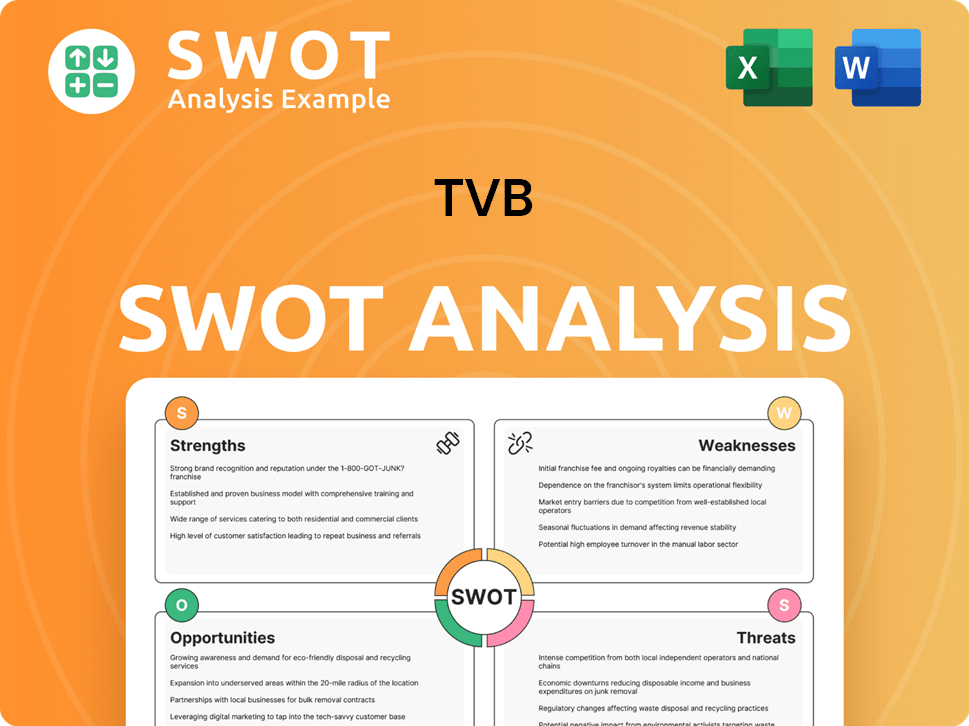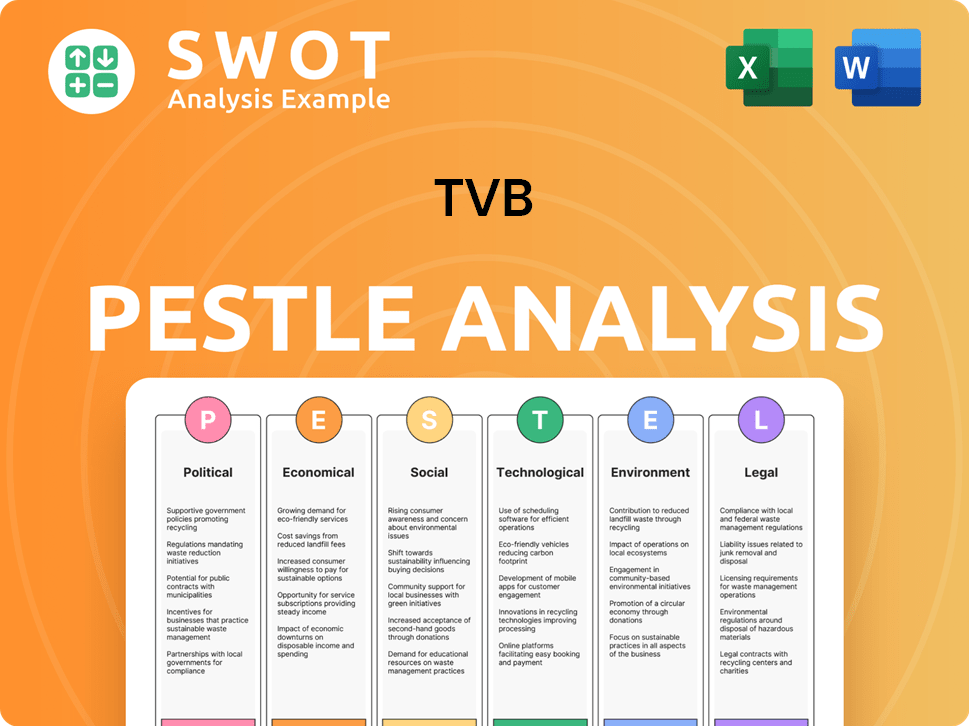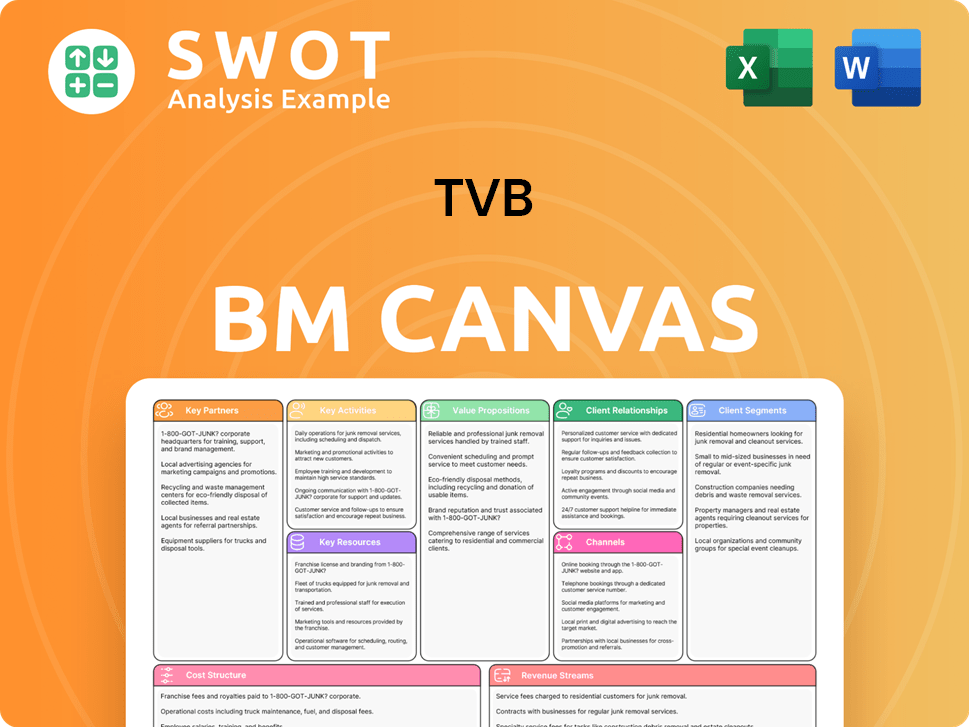TVB Bundle
How Did TVB Shape Hong Kong's Cultural Landscape?
Ever wondered how a single television station could captivate an entire city and beyond? Television Broadcasts Limited (TVB) didn't just broadcast; it built an empire. From its humble beginnings in 1965, TVB revolutionized Hong Kong's media scene, becoming synonymous with entertainment and shaping the cultural identity of millions.

TVB's TVB SWOT Analysis reveals the company's journey from a pioneering free-to-air station to a global entertainment powerhouse. The company's early years saw it dominate Hong Kong entertainment, particularly with its popular Cantonese drama series, which catapulted many TVB actors and actresses to stardom. Despite facing modern challenges, TVB continues to adapt, aiming to maintain its influence in the ever-evolving media landscape.
What is the TVB Founding Story?
The story of Television Broadcasts Limited (TVB) begins in the mid-1960s, marking a pivotal moment in the history of Hong Kong television. Officially incorporated on July 26, 1965, the company's founding was a strategic move to revolutionize the entertainment landscape. This initiative aimed to provide accessible television programming to a broad audience.
The company's launch on November 19, 1967, was a landmark event, introducing free-to-air television to Hong Kong. This was a stark contrast to the existing pay-TV service, Rediffusion Television, which was the only option at the time. This strategic move by the founders, including Sir Run Run Shaw, Sir Douglas Clague, and Harold Lee Hsiao-wo, aimed to broaden the reach of television entertainment.
Sir Run Run Shaw, a key figure and later chairman from 1980 to 2012, played a crucial role in securing a government franchise. This allowed TVB to establish Hong Kong's first free-to-air channel. The initial challenge was to offer an alternative to the existing subscription-based model, making entertainment accessible to a wider audience.
TVB's launch introduced free-to-air television, differentiating itself from the paid cable service. The company's early programming included both Cantonese and English channels. The company's early broadcasts and strategic decisions set the stage for its future in the Hong Kong entertainment industry.
- The Cantonese channel, TVB Jade, began regular service at 4:30 pm on Channel 21.
- The English service, TVB Pearl, started at 6:00 pm on Channel 25.
- Inaugural programming included the Chinese language variety show 'Enjoy Yourself Tonight'.
- The company was originally located on Broadcast Drive in Kowloon Tong.
On its launch day, TVB broadcast two channels: TVB Jade in Cantonese and TVB Pearl in English. The Cantonese channel, TVB Jade, started regular service at 4:30 pm on Channel 21, while the English service, TVB Pearl, began at 6:00 pm on Channel 25. The inaugural programming included the Chinese variety show 'Enjoy Yourself Tonight' and the English current affairs program 'Meet The Press'. The company was originally located on Broadcast Drive in Kowloon Tong. This strategic approach, focusing on both local and international content, helped establish TVB's presence in the Hong Kong entertainment market.
The early years of TVB were marked by significant investment in programming and infrastructure. The company quickly became a major player in the Hong Kong entertainment scene, producing a wide range of content, including dramas, variety shows, and news programs. The company's early success was a result of its ability to understand and cater to the local audience. The company's success can be seen in the context of the Growth Strategy of TVB, which has evolved over the years.
TVB SWOT Analysis
- Complete SWOT Breakdown
- Fully Customizable
- Editable in Excel & Word
- Professional Formatting
- Investor-Ready Format

What Drove the Early Growth of TVB?
The early phase of TVB's history marked a period of rapid expansion and influence in Hong Kong. This growth was fueled by strategic infrastructure development and a focus on content creation. The company quickly established itself as a dominant force in Hong Kong television.
Within a year of its launch in May 1968, TVB expanded its coverage significantly. Two broadcast relay stations were established on Lamma Island and Castle Peak. This expansion increased coverage to areas including Pok Fu Lam, Aberdeen, and Repulse Bay, solidifying its position as the first free-to-air television station in Hong Kong.
By the late 1980s, TVB outgrew its original facility. A new studio complex, T.V. City, was constructed at 220 Clear Water Bay Road and began operations in November 1988. This new facility provided a state-of-the-art environment for the production of Cantonese drama and other programming.
TVB began its international expansion in 1991 with the establishment of TVB Marketing International in Brazil. This was followed by offices in Africa and the Middle East, including Egypt, Bahrain, and the United Arab Emirates. In 2000, TVB Australia was founded, offering a 17-channel satellite service to over 25,000 households.
In 2016, TVB launched its video streaming service, myTV SUPER, to cater to changing audience viewing habits. The platform has grown to over 10.5 million registered users. In 2024, TVB's self-operated terrestrial TV channels held a 79% market share of viewership in Hong Kong.
TVB PESTLE Analysis
- Covers All 6 PESTLE Categories
- No Research Needed – Save Hours of Work
- Built by Experts, Trusted by Consultants
- Instant Download, Ready to Use
- 100% Editable, Fully Customizable

What are the key Milestones in TVB history?
The TVB history is marked by significant milestones that have shaped Hong Kong television and Hong Kong entertainment. Over the years, the company has expanded its reach and influence, becoming a household name in the region and beyond.
| Year | Milestone |
|---|---|
| 2007 | Launched HD Jade, a 24-hour HD channel, marking a significant advancement in visual entertainment. |
| 2008 | Introduced interactive television services, a first for free television in Hong Kong, and launched the 'myTV' web service. |
| 2008 | The mobile application became a top downloaded application in Hong Kong, with over 3 million cumulative new downloads in its first year. |
| 2015 | After its rival Asia Television (ATV) went under, the company's duopoly effectively became a monopoly until the launch of ViuTV. |
| 2016 | Launched myTV SUPER, a streaming platform that became a leading player in Hong Kong, with over 10.5 million registered users. |
| 2024 | Reduced its self-operated terrestrial TV channels from five to four by merging J2 and TVB Finance, Sports & Information channels to create the new TVB Plus channel. |
TVB has consistently embraced innovation to stay ahead in the competitive media landscape. The introduction of digital channels and interactive services demonstrates its commitment to adapting to changing viewer preferences. The company has also been exploring artificial intelligence for creative and production purposes, including dubbing and subtitles.
The official launch of HD Jade on December 31, 2007, provided high-definition audio/visual entertainment, setting a new standard for Hong Kong television. This move showcased TVB's commitment to technological advancement and improved viewer experience.
TVB introduced interactive television services on August 8, 2008, a first for free television in Hong Kong. This allowed viewers to engage more directly with programming.
The launch of myTV in 2008 and myTV SUPER in 2016 expanded content accessibility. This allowed users to catch up on TVB programs on various devices, increasing viewership.
The introduction of digital channels like J2 (June 2008) and iNews (January 2009) expanded the range of content available to viewers. These channels catered to different audience segments.
Embracing artificial intelligence for creative and production purposes, including dubbing and subtitles, streamlined content creation. This helped TVB to improve efficiency and enhance content quality.
Co-production titles such as 'No Room For Crime' and 'Big Biz Duel' began airing on Youku and Tencent Video in 2024. This strategy allowed TVB to expand its reach into mainland China.
Despite its successes, TVB has faced significant challenges in recent years. Declining advertising revenue and increased competition have impacted the company's financial performance. The company has also faced public criticism regarding its news coverage and accusations of 'cyberbullying'.
From 2019 to 2020, advertising revenue plummeted by 54 percent, leading to year-on-year financial losses. This decline was attributed to changing viewer habits and increased competition.
The rise of new media platforms and changing viewer preferences have intensified competition. This has forced TVB to adapt its strategies to stay relevant.
A perceived decline in the quality and originality of its dramas has also affected viewership. This has led to concerns about the long-term sustainability of its content strategy.
The company has faced public criticism regarding its news coverage. This has affected its reputation and public trust.
To address these challenges, TVB has undertaken strategic shifts, including a transformation journey since 2016 to become a major digital player with direct-to-customer capabilities. The company has focused on expanding into mainland China.
TVB downsized its e-Commerce business by closing the Ztore platform to streamline content production and reduce overheads. This move reflects efforts to optimize operations.
For a deeper dive into the financial aspects, you can explore Revenue Streams & Business Model of TVB.
TVB Business Model Canvas
- Complete 9-Block Business Model Canvas
- Effortlessly Communicate Your Business Strategy
- Investor-Ready BMC Format
- 100% Editable and Customizable
- Clear and Structured Layout

What is the Timeline of Key Events for TVB?
The brief history of TVB is marked by several key milestones that have shaped the landscape of Hong Kong television and entertainment. From its founding in 1965, TVB has grown into a significant media player, influencing Hong Kong culture and expanding its reach internationally through various platforms and services.
| Year | Key Event |
|---|---|
| July 26, 1965 | Television Broadcasts Limited (TVB) is incorporated, marking the beginning of its journey in the Hong Kong entertainment industry. |
| November 19, 1967 | TVB commences broadcasting, launching TVB Jade and TVB Pearl, introducing Cantonese drama and other programming to audiences. |
| May 15, 1968 | Two broadcast relay stations become operational, expanding TVB's coverage across Hong Kong. |
| November 1988 | TVB moves to T.V. City, a new studio complex, enhancing its production capabilities. |
| 1991 | TVB Marketing International is established, initiating international expansion efforts. |
| 2000 | TVB Australia is established, offering a satellite service with 17 channels. |
| October 2003 | The state-of-the-art TVB City in Tseung Kwan O Industrial Estate becomes fully operational. |
| December 31, 2007 | TVB launches its 24-hour HD channel, HD Jade. |
| August 8, 2008 | TVB launches interactive television services, enhancing viewer engagement. |
| 2016 | TVB launches myTV SUPER, its video streaming service, expanding its digital presence. |
| 2018 | Big Big Shop (BBS), an e-commerce platform, is inaugurated. |
| August 2021 | TVB acquires a controlling stake in the Ztore group. |
| 2024 | TVB's net loss narrows by 36% to HK$491 million, with positive EBITDA of HK$295 million. |
| 2024 | TVB reduces its self-operated terrestrial TV channels from five to four by merging J2 and TVB Finance, Sports & Information channels to create the new TVB Plus channel. |
TVB is optimistic about achieving a positive net profit in 2025. The company anticipates continued growth in advertising income, driven by strong precommitments and the launch of Greater Bay Area advertising services. Digital advertising on myTV SUPER is also expected to perform well.
TVB is embracing artificial intelligence for creative and production processes. AI is being used for dubbing and subtitles, enhancing content creation. These advancements aim to improve efficiency and content quality.
The company aims to record a full-year net profit in 2025 after a loss in 2024. This reflects TVB's efforts to improve its financial performance. The focus is on sustainable growth and profitability.
TVB's forward-looking strategy aligns with its founding vision of providing diverse, high-quality television entertainment. This vision is now adapted for a multi-platform digital landscape. The goal is to remain relevant in the evolving media environment.
TVB Porter's Five Forces Analysis
- Covers All 5 Competitive Forces in Detail
- Structured for Consultants, Students, and Founders
- 100% Editable in Microsoft Word & Excel
- Instant Digital Download – Use Immediately
- Compatible with Mac & PC – Fully Unlocked

Related Blogs
- What is Competitive Landscape of TVB Company?
- What is Growth Strategy and Future Prospects of TVB Company?
- How Does TVB Company Work?
- What is Sales and Marketing Strategy of TVB Company?
- What is Brief History of TVB Company?
- Who Owns TVB Company?
- What is Customer Demographics and Target Market of TVB Company?
Disclaimer
All information, articles, and product details provided on this website are for general informational and educational purposes only. We do not claim any ownership over, nor do we intend to infringe upon, any trademarks, copyrights, logos, brand names, or other intellectual property mentioned or depicted on this site. Such intellectual property remains the property of its respective owners, and any references here are made solely for identification or informational purposes, without implying any affiliation, endorsement, or partnership.
We make no representations or warranties, express or implied, regarding the accuracy, completeness, or suitability of any content or products presented. Nothing on this website should be construed as legal, tax, investment, financial, medical, or other professional advice. In addition, no part of this site—including articles or product references—constitutes a solicitation, recommendation, endorsement, advertisement, or offer to buy or sell any securities, franchises, or other financial instruments, particularly in jurisdictions where such activity would be unlawful.
All content is of a general nature and may not address the specific circumstances of any individual or entity. It is not a substitute for professional advice or services. Any actions you take based on the information provided here are strictly at your own risk. You accept full responsibility for any decisions or outcomes arising from your use of this website and agree to release us from any liability in connection with your use of, or reliance upon, the content or products found herein.